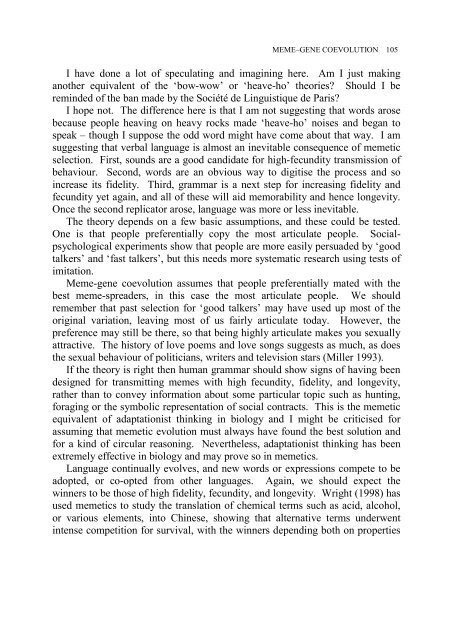The Meme Machine
TheMemeMachine1999
TheMemeMachine1999
- No tags were found...
You also want an ePaper? Increase the reach of your titles
YUMPU automatically turns print PDFs into web optimized ePapers that Google loves.
MEME–GENE COEVOLUTION 105<br />
I have done a lot of speculating and imagining here. Am I just making<br />
another equivalent of the ‘bow-wow’ or ‘heave-ho’ theories? Should I be<br />
reminded of the ban made by the Société de Linguistique de Paris?<br />
I hope not. <strong>The</strong> difference here is that I am not suggesting that words arose<br />
because people heaving on heavy rocks made ‘heave-ho’ noises and began to<br />
speak – though I suppose the odd word might have come about that way. I am<br />
suggesting that verbal language is almost an inevitable consequence of memetic<br />
selection. First, sounds are a good candidate for high-fecundity transmission of<br />
behaviour. Second, words are an obvious way to digitise the process and so<br />
increase its fidelity. Third, grammar is a next step for increasing fidelity and<br />
fecundity yet again, and all of these will aid memorability and hence longevity.<br />
Once the second replicator arose, language was more or less inevitable.<br />
<strong>The</strong> theory depends on a few basic assumptions, and these could be tested.<br />
One is that people preferentially copy the most articulate people. Socialpsychological<br />
experiments show that people are more easily persuaded by ‘good<br />
talkers’ and ‘fast talkers’, but this needs more systematic research using tests of<br />
imitation.<br />
<strong>Meme</strong>-gene coevolution assumes that people preferentially mated with the<br />
best meme-spreaders, in this case the most articulate people. We should<br />
remember that past selection for ‘good talkers’ may have used up most of the<br />
original variation, leaving most of us fairly articulate today. However, the<br />
preference may still be there, so that being highly articulate makes you sexually<br />
attractive. <strong>The</strong> history of love poems and love songs suggests as much, as does<br />
the sexual behaviour of politicians, writers and television stars (Miller 1993).<br />
If the theory is right then human grammar should show signs of having been<br />
designed for transmitting memes with high fecundity, fidelity, and longevity,<br />
rather than to convey information about some particular topic such as hunting,<br />
foraging or the symbolic representation of social contracts. This is the memetic<br />
equivalent of adaptationist thinking in biology and I might be criticised for<br />
assuming that memetic evolution must always have found the best solution and<br />
for a kind of circular reasoning. Nevertheless, adaptationist thinking has been<br />
extremely effective in biology and may prove so in memetics.<br />
Language continually evolves, and new words or expressions compete to be<br />
adopted, or co-opted from other languages. Again, we should expect the<br />
winners to be those of high fidelity, fecundity, and longevity. Wright (1998) has<br />
used memetics to study the translation of chemical terms such as acid, alcohol,<br />
or various elements, into Chinese, showing that alternative terms underwent<br />
intense competition for survival, with the winners depending both on properties



